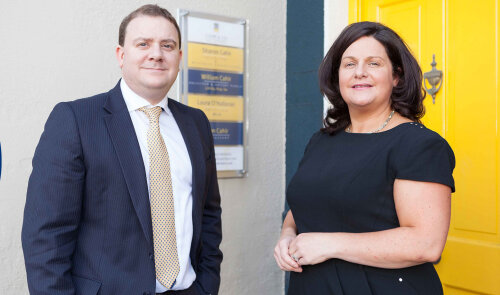Best Assault & Battery Lawyers in Ennis
Share your needs with us, get contacted by law firms.
Free. Takes 2 min.
List of the best lawyers in Ennis, Ireland
About Assault & Battery Law in Ennis, Ireland
Assault and battery in Ireland concern acts of violence or the threat of violence against another person. In simple terms, assault typically means an act that causes another person to fear immediate unlawful force, while battery refers to the unlawful application of force. Both civil and criminal remedies can apply. Criminal cases are investigated by the Garda Siochana and prosecuted by the Director of Public Prosecutions. Victims may also bring civil actions for personal injury or seek protection orders in family or civil courts. Courts in Ireland handle these matters at different levels depending on the seriousness of the alleged offence, and penalties can range from fines and community sanctions to imprisonment.
Why You May Need a Lawyer
There are many situations where specialist legal help is important:
- If you are accused of assault or battery - to protect your rights in the Garda station and in court, to advise on bail and possible defences such as self-defence.
- If you have been assaulted - to advise on steps to preserve evidence, to represent you if you wish to make a victim impact statement, or to bring a personal injuries claim for compensation.
- If an incident occurred in a domestic setting - to pursue or defend applications for protection orders or barring orders and to navigate related family law issues.
- If the alleged assault involves young people, workplace incidents, or complex evidential issues - a lawyer can clarify applicable procedures and potential outcomes.
- To access legal aid or to understand likely costs, court procedures, and sentencing ranges - a solicitor experienced in criminal and civil personal injury law can provide practical advice and representation.
Local Laws Overview
Key aspects to be aware of in the Ennis and wider Irish context:
- Criminal and civil routes - Assault can be pursued as a criminal offence by the State, and an injured person may also bring a civil personal injuries claim for damages.
- Range of offences - Irish law covers a spectrum from common assault to assault causing harm and more serious non-fatal offences. The classification of an offence affects where it is heard and the potential penalties.
- Charging and prosecution - After an incident is reported, the Garda may investigate and the DPP decides whether to prosecute and on what charges.
- Court structure - Less serious matters may be dealt with in the District Court, while more serious or indictable offences go to higher courts such as the Circuit Court or Central Criminal Court.
- Rights at arrest and interview - Persons suspected of offences have rights, including the right to legal representation and the right to be informed of the reason for arrest. It is important to exercise the right to speak to a solicitor before giving a full account to Gardaí.
- Protective orders - There are mechanisms for victims to seek protection from further abuse, including civil protection orders and other court-based remedies designed to protect victims and dependants.
- Evidence and proof - Successful criminal and civil cases depend on quality evidence - medical reports, photographs, witness statements, CCTV, and contemporaneous notes are commonly relied upon.
- Time limits - Civil personal injuries claims are subject to limitation periods, so acting promptly is important. Criminal prosecution timetables vary by offence and procedure.
Frequently Asked Questions
What is the legal difference between assault and battery in Ireland?
Common usage distinguishes assault as making someone fear immediate unlawful force and battery as the unlawful application of force. In practice, Irish criminal law deals with a range of non-fatal offences that capture both threatening behaviour and actual physical contact. Whether an incident is charged as an assault, assault causing harm, or a more serious offence depends on the facts and the harm caused.
What should I do immediately after an assault?
Your immediate priorities are safety and medical care. Get to a safe place, call emergency services if you are in danger, and seek medical attention for any injuries. Preserve evidence - keep clothing, take photographs of injuries and the scene, note witness names, and write down what happened while it is fresh in your memory. Report the incident to the local Garda station when it is safe to do so.
Will the Garda always arrest someone after I report an assault?
Not always. Gardaí will assess the situation and may arrest if there are reasonable grounds that an offence has been committed and arrest is necessary. In other cases they may record the complaint, take statements, and investigate before deciding whether to arrest or refer the matter to the DPP. If you are unsure about how the Garda are responding, you can ask for information on the process and your rights as a complainant.
Can I remain anonymous when reporting an assault?
You can give information without immediately identifying yourself in some circumstances; however, for a full criminal investigation and prosecution, authorities usually need a named complainant and witnesses. If you fear reprisals, tell the Garda - there are victim protection measures and support services that can assist with safety planning.
What happens if I am arrested for assault?
If you are arrested, Gardaí must tell you why you are being arrested and give you the opportunity to contact a solicitor. You have the right to legal representation and a private consultation with a solicitor before any formal interview. Decisions about charge, bail, or remand depend on the seriousness of the alleged offence and other factors to do with public safety and flight risk.
Do I need a solicitor for a Garda interview?
Yes. It is strongly advised to have a solicitor present during Garda interviews. A solicitor will protect your legal rights, advise on whether to answer questions, and help ensure the interview process is fair. If you cannot afford a solicitor, you may be eligible for legal aid - you should ask Gardaí or the Legal Aid Board how to apply.
Can I bring a civil claim for compensation after an assault?
Yes. If you suffered injury or loss due to an assault, you may be able to pursue a civil personal injuries claim for compensation. Civil claims and criminal prosecutions are separate - the State prosecutes criminally, while a civil case seeks damages. Civil claims are subject to limitation periods, so seek legal advice as soon as possible.
What types of evidence matter in assault and battery cases?
Medical records and reports, photographs of injuries and the scene, CCTV or dash-cam footage, witness statements and contact details, phone messages and call logs, and any contemporaneous notes you made all help build a case. Preserve original items of clothing and any objects involved in the incident. A solicitor can advise on collecting and presenting evidence properly.
What defences may be available if I am accused of assault?
Common defences include lawful self-defence or defence of another, lack of intent, mistaken identity, and evidence that the alleged contact was accidental or lawful. The applicability of any defence depends on the facts, and you should discuss the specifics with a solicitor before deciding how to proceed.
Where can victims get practical and emotional support in Ennis?
Victims are often assisted by local Garda victim services and by national and local support organisations that offer counselling, safety planning, and court accompaniment. Solicitors and the Legal Aid Board can also advise on legal options. If you feel unsafe, contact the Garda immediately for protection and referrals.
Additional Resources
Here are organisations and bodies that can provide information, support, or formal services:
- Garda Siochana - local police station for reporting incidents and immediate protection.
- Director of Public Prosecutions - the State body that decides on criminal prosecutions.
- Legal Aid Board - can provide information on civil and criminal legal aid eligibility and application procedures.
- Law Society of Ireland - maintains a register of solicitors and provides guidance on selecting a solicitor.
- Citizens Information - government-provided information on rights, court processes, and support options.
- Victim support organisations - groups that provide emotional support, practical assistance at court, and signposting to services.
- Domestic and sexual violence support services - local and national charities that specialise in safety planning and legal options for victims of domestic abuse or sexual violence.
- Free legal advice clinics - local clinics or services that offer preliminary legal guidance for those who cannot immediately afford private representation.
Next Steps
If you have been assaulted or face an allegation of assault, these steps will help you move forward:
- Ensure immediate safety - if you are in danger, call emergency services right away.
- Seek medical attention - get injuries documented by a medical professional and keep copies of records.
- Preserve and collect evidence - photograph injuries and the scene, keep clothing, save messages, and note witness details.
- Report to the Garda - make a formal statement when safe to do so, and ask for a record of the report.
- Contact a solicitor - find one experienced in criminal law and personal injuries to advise on your rights, potential defences, or a civil claim. Ask about fees, estimated costs, and whether you may qualify for legal aid.
- Consider support services - for emotional support, safety planning, and help navigating court processes.
- Keep records - retain all documentation, receipts for expenses related to the incident, and any communication about the case.
- Attend all legal appointments and court dates - missing hearings can affect outcomes for both complainants and defendants.
Disclaimer - This guide provides general information and is not legal advice. Laws change and every case has unique facts. For advice tailored to your situation, consult a solicitor who practices in the relevant area of law in Ennis or County Clare.
Lawzana helps you find the best lawyers and law firms in Ennis through a curated and pre-screened list of qualified legal professionals. Our platform offers rankings and detailed profiles of attorneys and law firms, allowing you to compare based on practice areas, including Assault & Battery, experience, and client feedback.
Each profile includes a description of the firm's areas of practice, client reviews, team members and partners, year of establishment, spoken languages, office locations, contact information, social media presence, and any published articles or resources. Most firms on our platform speak English and are experienced in both local and international legal matters.
Get a quote from top-rated law firms in Ennis, Ireland — quickly, securely, and without unnecessary hassle.
Disclaimer:
The information provided on this page is for general informational purposes only and does not constitute legal advice. While we strive to ensure the accuracy and relevance of the content, legal information may change over time, and interpretations of the law can vary. You should always consult with a qualified legal professional for advice specific to your situation.
We disclaim all liability for actions taken or not taken based on the content of this page. If you believe any information is incorrect or outdated, please contact us, and we will review and update it where appropriate.










